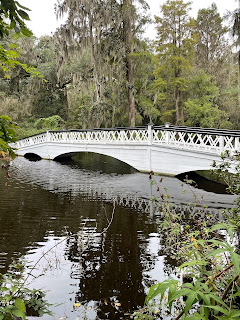Today we started with Magnolia Plantation. The plantation dates from 1676, and remains owned by the Drayton family some 13 generations later. The plantation produced rice in the early days and was known for its gardens featuring azaleas. The house is the third one on the property. The original was hit by lightening in 1800 and burned down. The second was razed by the Union soldiers at the close of the Civil War. As the owner was a minister and stayed neutral during the war, the soldiers left the crops and the store houses. The third house is quite modest compared to the early mansions, as the owner raised the money to build it by conducting tours of his historic gardens. His daughter married into money and extended the house a bit more.
There was a replica of a barge that was used to float the wares to Charleston. We learned the Ashley River is tidal and you could float down river, then back again when the tide turned.
We did the tour From Slavery to Freedom, which covered the slave quarters and talked about the life of the enslaved individuals. The cabins have been restored to various periods of occupation, through to the 1960’s when they had electric lighting.
We then went to Drayton Hall, next door. This was an
interesting tour as Drayton Hall has not been restored, but preserved. There is
no furniture in place, and the site is still be investigated by archaeologists.
Drayton Hall was constructed from 1738-1752 and was one of the few plantation
home to survive the scorched earth policy of the Union soldiers during the war.
The reason is believed to be either as it was being used as a field hospital,
or that it was a smallpox quarantine station. The plantation was based on rice
and indigo, and later on phosphate. John Drayton owned more than 100 commercial
plantations totalling approximately 76,000 acres of land. Following the Civil
War he (and other plantation owners) moved to Mexico to take up land there.
That was when the property was leased to phosphate mining companies.



































No comments:
Post a Comment